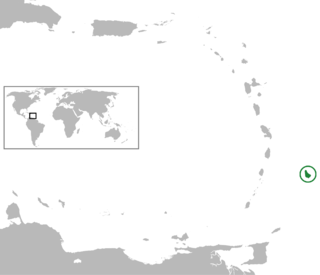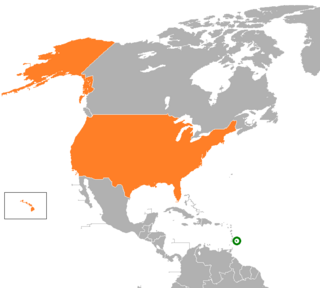| Joes River | |
|---|---|
| Location | |
| Country | Barbados |
| Parish | Saint Joseph, Barbados |
| Physical characteristics | |
| Mouth | Atlantic Ocean |
• coordinates | 13°13′02″N59°31′37″W / 13.21729°N 59.52707°W |
• elevation | Sea level |
The Joes River is a river of Barbados.
| Joes River | |
|---|---|
| Location | |
| Country | Barbados |
| Parish | Saint Joseph, Barbados |
| Physical characteristics | |
| Mouth | Atlantic Ocean |
• coordinates | 13°13′02″N59°31′37″W / 13.21729°N 59.52707°W |
• elevation | Sea level |
The Joes River is a river of Barbados.

Barbados is an island country in the Lesser Antilles of the West Indies, in the Caribbean region of North America, and is the most easterly of the Caribbean islands. It lies on the boundary of the South American and the Caribbean Plates. Its capital and largest city is Bridgetown.
Barbados is an island country in the southeastern Caribbean Sea, situated about 100 miles (160 km) east of Saint Vincent and the Grenadines. Roughly triangular in shape, the island measures some 21 miles (34 km) from northwest to southeast and about 14 miles (23 km) from east to west at its widest point. The capital and largest town is Bridgetown, which is also the main seaport.

Bridgetown is the capital and largest city of Barbados. Formerly The Town of Saint Michael, the Greater Bridgetown area is located within the parish of Saint Michael. Bridgetown is sometimes locally referred to as "The City", but the most common reference is simply "Town". As of 2014, its metropolitan population stands at roughly 110,000.

The Arawak are a group of indigenous peoples of northern South America and of the Caribbean. Specifically, the term "Arawak" has been applied at various times from the Lokono of South America to the Taíno, who lived in the Greater Antilles and northern Lesser Antilles in the Caribbean. All these groups spoke related Arawakan languages.

The Exocoetidae are a family of marine ray-finned fish in the order Beloniformes, known colloquially as flying fish or flying cod. About 64 species are grouped in seven genera. While they cannot fly in the same way a bird does, flying fish can make powerful, self-propelled leaps out of the water where their long wing-like fins enable gliding for considerable distances above the water's surface. The main reason for this behavior is thought to be to escape from underwater predators, which include swordfish, mackerel, tuna, and marlin, among others, though their periods of flight expose them to attack by avian predators such as frigate birds.

The parish of St. Michael is one of eleven parishes of Barbados. It has a land area of 39 km2 (15 sq mi) and is found at the southwest portion of the island. Saint Michael has survived by name as one of the original six parishes created in 1629 by Governor Sir William Tufton.

The Barbados national football team, nicknamed Bajan Tridents, is the national football team of Barbados, and is controlled by the Barbados Football Association. It has never qualified for a major international tournament. It came close to qualifying for the 2005 CONCACAF Gold Cup as it hosted the Caribbean Cup finals that acted as Gold Cup qualifiers, but finished fourth of the four teams. In 2001, it surprised many by making the semi-final round of the 2002 World Cup Qualifiers. In the first game of this round, they pulled off a shock 2–1 win over Costa Rica, but lost their five remaining games. In 2004, Barbados gained a shock 1–1 draw at home to Northern Ireland.

The Barbados national cricket team is the national cricket team of Barbados, organised by the Barbados Cricket Association (BCA). Barbados is a member of the West Indies Cricket Board (WICB), which is a member of the International Cricket Council (ICC) in its own right, and Barbadians play internationally for the West Indies cricket team.
The Great Barbados hurricane was an intense Category 4 hurricane that left cataclysmic damage across the Caribbean and Louisiana in 1831.

The following is an alphabetical list of topics related to the nation of Barbados.

Barbadians or Bajans (pronounced BAY-jənz) are people who are identified with the country of Barbados, by being citizens or their descendants in the Barbadian diaspora. The connection may be residential, legal, historical or cultural. For most Barbadians, several of those connections exist and are collectively the source of their identity. Barbadians are a multi-ethnic and multicultural society of various ethnic, religious and national origins; therefore Barbadians do not necessarily equate their ethnicity with their Barbadian nationality.
This article describes the history of West Indies cricket to 1918.

The monarchy of Barbados was a system of government in which a hereditary monarch was the sovereign and head of state of Barbados from 1966 to 2021. Barbados shared the sovereign with the other Commonwealth realms, with the country's monarchy being separate and legally distinct. The monarch's operational and ceremonial duties were mostly delegated to her representative, the governor-general of Barbados.

The United States and Barbados have had cordial bilateral relations since Barbados' independence in 1966. The United States has supported the government's efforts to expand the country's economic base and to provide a higher standard of living for its citizens. Barbados is a beneficiary of the U.S. Caribbean Basin Initiative. U.S. assistance is channeled primarily through multilateral agencies such as the Inter-American Development Bank and the World Bank, as well as the U.S. Agency for International Development (USAID) office in Bridgetown.

The following outline is provided as an overview of and introduction to Barbados:
The Lokono or Arawak are an Arawak people native to northern coastal areas of South America. Today, approximately 10,000 Lokono live primarily along the coasts and rivers of Venezuela, Guyana, Suriname, Barbados and French Guiana. They speak the Arawak language, the eponymous language of the Arawakan language family, as well as various Creole languages, and English.

Dame Sandra Prunella Mason is a Barbadian politician, lawyer, and diplomat who is serving as the first president of Barbados since 2021. She was previously the eighth and final governor-general of Barbados from 2018 to 2021, the second woman to hold the office. On 20 October 2021, Mason was elected by the Parliament of Barbados to become the country's first president, and took office on 30 November 2021, when Barbados ceased to be a constitutional monarchy and became a republic.

Surinam, also known as Willoughbyland, was a short-lived early English colony in South America in what is now Suriname. It was founded in 1650 by Lord Willoughby when he was the Royalist Governor of Barbados.